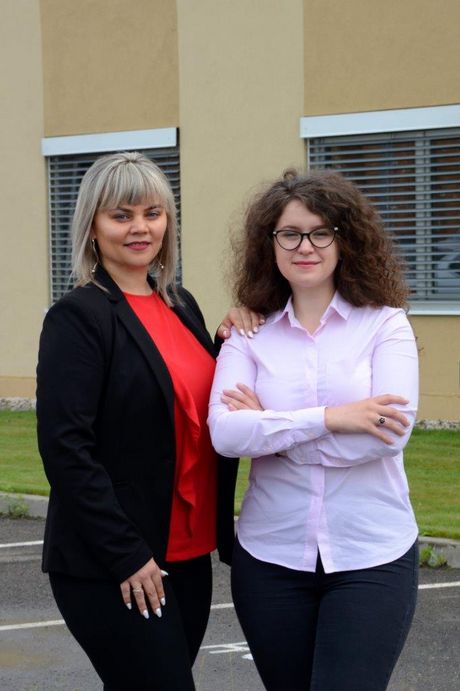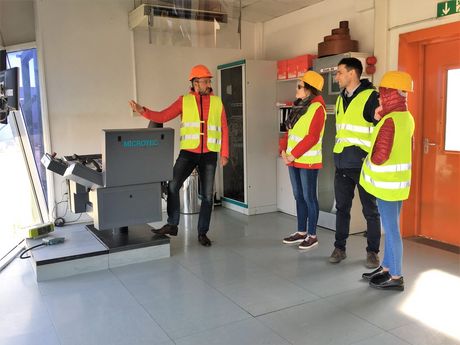Students complete yet another internship stage at HS Rădăuți
The curtain has been drawn at HS Rădăuți, after ten students from the Ștefan cel Mare University of Suceava have completed their internship, which lasted from April to June. The internship is part of the <link no_cache en responsibility schweighofer-action-plan detail this-spring-blossoms-open-in-radauti.html>INDIP – Learn through Internship programme, following a convention between the higher education institution, the Suceava Chamber of Commerce and Industry and the Holzindustrie Schweighofer sawmill in Rădăuți.
During 90 hours spent in the departments of accounting, logistics, human resources, fire protection, health and safety, legal – archiving, supply and sales support, have offered the students the opportunity to understand the specifics of the company’s activity, as well as tangible and operational day-to-day aspects. Another ten hours have been saved for the completion of the internship report.
Sorina Răuțu, the human resources manager at the <link en company production-sites radauti.html>Rădăuți mill and the tutor of the programme, speaks fondly of the young scholars: “At the beginning, they were all cautious and shy, but, after they were split in groups and were given explanations on how things work around here - including the organisational aspects (the allotted work space, the personnel involved, transport and lunch), the students loosened up and fit in rightly.”
There were weekly feedback meetings during the entire programme, so that it fits the students’ expectations and needs. Moreover, “discussions along the way were also needed, so that I could fully support the students and impart all the information I had to make them find solutions by themselves,” adds Sorina.
Internships ‘for real’
On their very first day at the Rădăuți mill, the students received fire protection and health and safety trainings and visited the production facility. They were fully supported by the company’s employees during their entire stay, they received information they needed to complete their internship report and learned concrete details about how each department works.
Ovidiu Biciușcă, one of the participants, detailed: “I learned that both the members of the human resources department and those in the fire protection and health and safety departments must meet all organisation’s current needs, at the same time respecting the legislation relevant to each department, I learned how the health and safety and fire protection trainings are done and I saw what the heads of these departments do on a daily basis.”
As a member of the human resources department, Ovidiu learned, among other things, “the way to recruit personnel, how an interview is being conducted, how to use the Revisal programme, how one calculates a salary, as well as other operations, specific to the HR department.”
In addition to being involved in the human resources department, Dorina Harviștiuc, also a student part of the INDIP programme, actively took part in the daily activities of the company. “I submitted waybills in the SUMAL AGENT programme, I stamped cargo reception notes, I stamped, checked and scanned documents,” she says. “In the sales department I put in order and attached customs declarations to invoices, I input in the TICOM programme the invoices and the notes accompanying the export invoices.”
Doing an on-site internship is a great advantage for a young graduate which applies for a vacancy. Sorina Răuțu explains: “As a rule, when we hire, in the case of young graduates who lack work experience, we put special emphasis on internship done during their student years, especially if those were done properly, by showing involvement and accountability.”
An example of success
Andreea Ștefana Stoica is a human resources inspector at the Rădăuți mill. Her first contact with Holzindustrie Schweighofer was the interview she took to be part on an internship programme, which lasted for two months, in the summer of 2016.
“The fact that Andreea is now an employee following an internship programme is gratifying and should be a model to any other student,” feels Sorina. “I am very proud that there has been a will from both parties to conclude the internship programme through an employment contract and that the collaboration she and I now have is beneficial.”
When she joined the company, Andreea was only 22-years old, had no work experience and, moreover, had graduated in a different field. “My work experience equalled zero, as I had studied a completely different specialty,” she says. “I was thinking of getting a PhD in Letters but, when I received the employment offer, I accepted on the spot. I felt, back then, that my involvement during those two months of internship was appreciated, and that I worked towards an end.”
Questioned about what any intern should pay attention to in order to be considered for a job offer, Andreea Ștefana enumerates: “punctuality, seriousness, understanding, goodwill, common sense, eagerness to learn - these are some basic qualities which I think are appreciated, but other aspects are appreciated as well, tailored to the specifics of each department.”
Can a young person, with no work experience, get employed in an important position in a factory with over 500 employees? The answer is affirmative and, in the case of Andreea Ștefana, Sorina underlines: “Her way of getting involved and the seriousness she proved, alongside the other candidates, recommended that Andreea Ștefana becomes my colleague. She’s my successful apprentice, very dear to my heart.”
Generation gap in a team – an evolution
The human resources manager sees a generation gap during the internship programmes. “If I were to compare colleagues who, for example, already have ten years of experience here, the generations coming after us are more inclined to use technology more often,” says Sorina. “Nevertheless, the young people are willing to learn and are aware that their simple involvement in this internship programme means a great deal for the career they chose to follow.”
At the same time, Sorina has noticed that the young generation “emphasises very much their own self, because they are more individualistic. And yes, they can adapt when they join a team, but the team also accommodates on the go. Here, they all saw how we work as a team and they thought it to be wonderful.”
Gabriela Fundu, one of the interns, says that “the people I came in contact with were patient, they took time to explain all my uncertainties and to teach me the new things I learned following this experience,” and Corina Bujdei said at the end of the programme that at HS “the team is generally open-minded and with a great sense of humour.” For Ioana Georgiana Ciorbă “the involvement of the HS personnel was pretty good, they even went overboard with asking us how we’re doing and whether we needed help with something.”
Sorina Răuțu admits that her involvement in this programme and the interaction with the young generations helps with her own personal evolution. “One can always find something to improve with themselves, and when one comes in contact with so many young and varied in age people, who all speak their mind, one can go back to working on what was thought handled.” Moreover, “one sometimes is asked questions who can change perspectives, see things from a new angle. This is continuing learning and for a specialist is an evolution.”
Internship programmes – a win for all parties involved
Lucian Gheorghiu, executive director at the Suceava Chamber of Commerce and Industry believes that “the implementation of the internship programmes has seen an uptrend. The effects of such programmes are very beneficial for all actors involved in the process,” he says. “On one hand, the academic environment must know the needs of the economy, and for the economic environment it is important to get to know the human resource. This partnership is the best instrument for the adaptation to the level of the employers’ expectations and for the correct training of the human resource to join the work force. Last but not least, the chambers of commerce play an active role of moderating and facilitating the relationships between all three parties.”
The Suceava Chamber of Commerce and Industry was involved in selecting the 25 internship partners in the INDIP programme, in organising and conducting the working-on-the-job programmes, including the simulated-enterprise type of activities.
Sorina continues: “For me personally, this was a pleasant experience, as I noticed I still have a lot to offer from what I have learned during the past 12 years which I spent working for Holzindustrie Schweighofer. I tend to believe I am made of a mentorship cloth, especially in the human resources field.” The three Masters’ students who were part of the human resources department, under the supervision of Sorina and Andreea Ștefana, now have a major advantage on the labour market, as they “worked closely with us and learned a lot in the field.”
Moreover, following the INDIP project, “our team has got a youthful vibe in turn, at the same time as trying to support the youngsters fully, to successfully complete this programme,” concluded the tutor of the programme.

